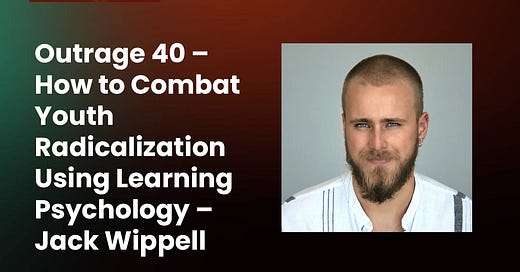The internet has become a breeding ground for radical ideologies and conspiracy theories. This phenomenon is particularly concerning when it comes to the radicalization of young people. With the proliferation of major social media platforms and the ease of access to extremist content, there has been a significant rise in cases of online radicalization among younger generations. In this episode, we explore the insights shared by Jack Wippell, an expert on extremism and radicalization, as he discusses the potential of social and emotional learning (SEL) to mitigate the spread of radical ideologies among youth.
The Rise of Online Radicalization
The internet has revolutionized the way information is disseminated, making it easier for extremist ideologies to spread rapidly. Jack Wippell highlights the significant increase in cases of online radicalization, particularly among young people. He attributes this rise to the accessibility of social media platforms and the ability to connect with like-minded individuals from around the world. The ease of access to extremist content, coupled with vulnerable psychological states, creates a perfect storm for radicalization.
Wippell emphasizes the importance of understanding the psychological factors that make individuals more susceptible to radicalization. One key factor is black and white thinking, where individuals see the world in binary terms of good versus evil, us versus them. Extremist narratives often appeal to this mindset by offering simple solutions to complex problems. Additionally, the transitional phase of adolescence makes young people more vulnerable to radical ideologies as they search for identity and purpose.
The Role of Social and Emotional Learning (SEL)
To combat the rising threat of online radicalization, Wippell suggests the potential of social and emotional learning (SEL) programs. SEL focuses on developing self-awareness, social awareness, self-management, relationship skills, and responsible decision-making. These skills are essential for young people to navigate the complexities of the online world and engage with others from different backgrounds.
Wippell argues that SEL can help counter the spread of radical ideologies by promoting critical thinking and empathy. By teaching young people to recognize different perspectives and integrate them into their own beliefs, SEL can foster a more nuanced understanding of the world. Additionally, SEL can equip individuals with the skills to identify and evaluate misinformation and disinformation, which are often used to spread extremist ideologies online.
Challenges and Opportunities
While SEL holds great potential in mitigating the spread of radical ideologies among youth, there are challenges that need to be addressed. Wippell highlights the backlash against SEL programs, with some viewing them as part of a perceived left-wing agenda. This political polarization hinders the implementation of comprehensive SEL programs and limits their effectiveness.
To overcome these challenges, Wippell suggests a multi-faceted approach that combines media literacy, SEL, and creativity in engaging young people. By recognizing the importance of empathy and positive mindsets, individuals can foster a culture of understanding and dialogue. Furthermore, the contagion effect can be harnessed positively by creating environments where empathy and validation are the norm, leading to a broader adoption of these values.
Summary
Jack Wippell dives deep into the potential of SEL to counter radicalization, while acknowledging real-world challenges. Listen to our insightful conversation and discover a multi-faceted approach to combating the concerning problem of online radicalization.
New This Week in Outrage Episode!
It’s everything the Outrage Overload podcast is not. It’s not edited. It’s not scripted. It’s lightly researched. It’s David and Lisa talking about this week in outrage, what was in the news, in the memes, and maybe finding some backstory with a humorous (at least to us) twist.
From Aperol Spritz to Medieval Babies 🇮🇹 🥂⛪︎ - 6/2/2024
This week, Lisa and David talk about University of the Arts shutters; Negro League stats integrated with MLB; college athletes getting paid; Harrison Butker controversial commencement speech; actor from 'Home Alone 2' convicted on 34 felonies; the problematic Supreme Court; medieval babies; Aperol Spritz is the ‘it’ drink for …





